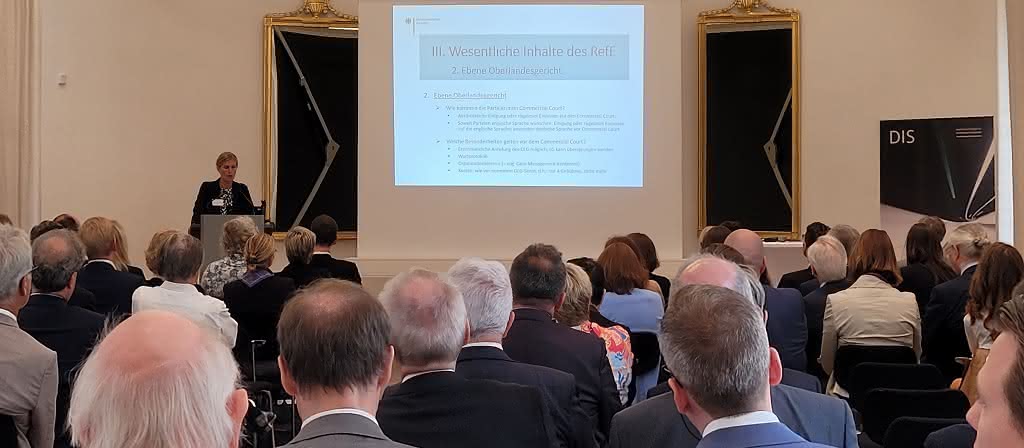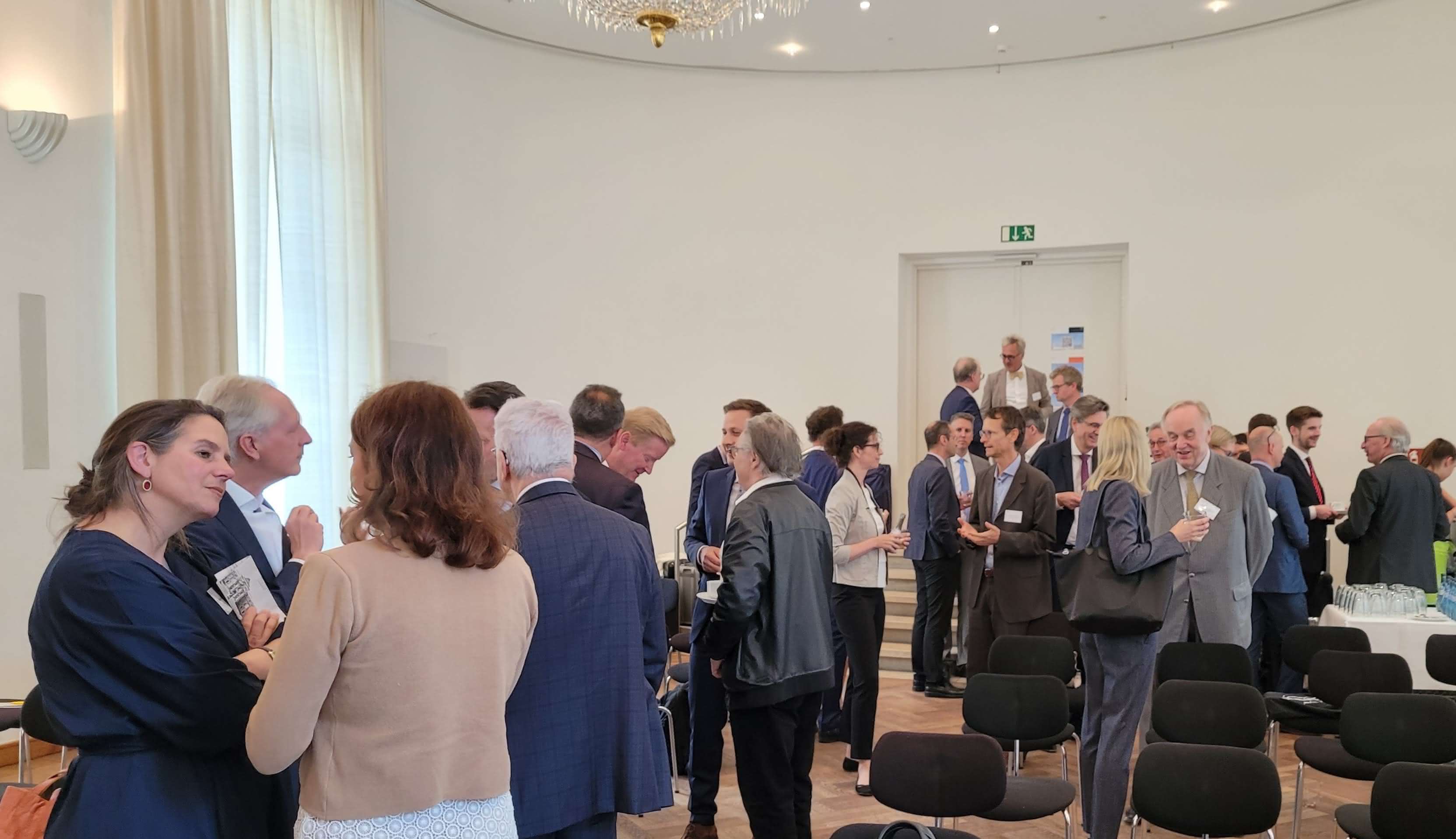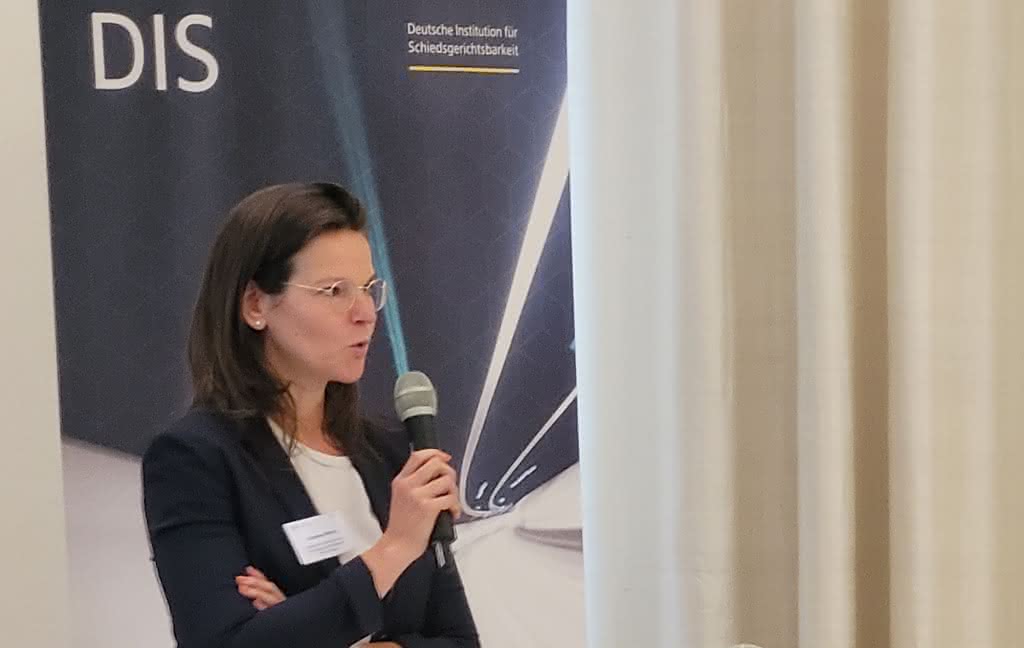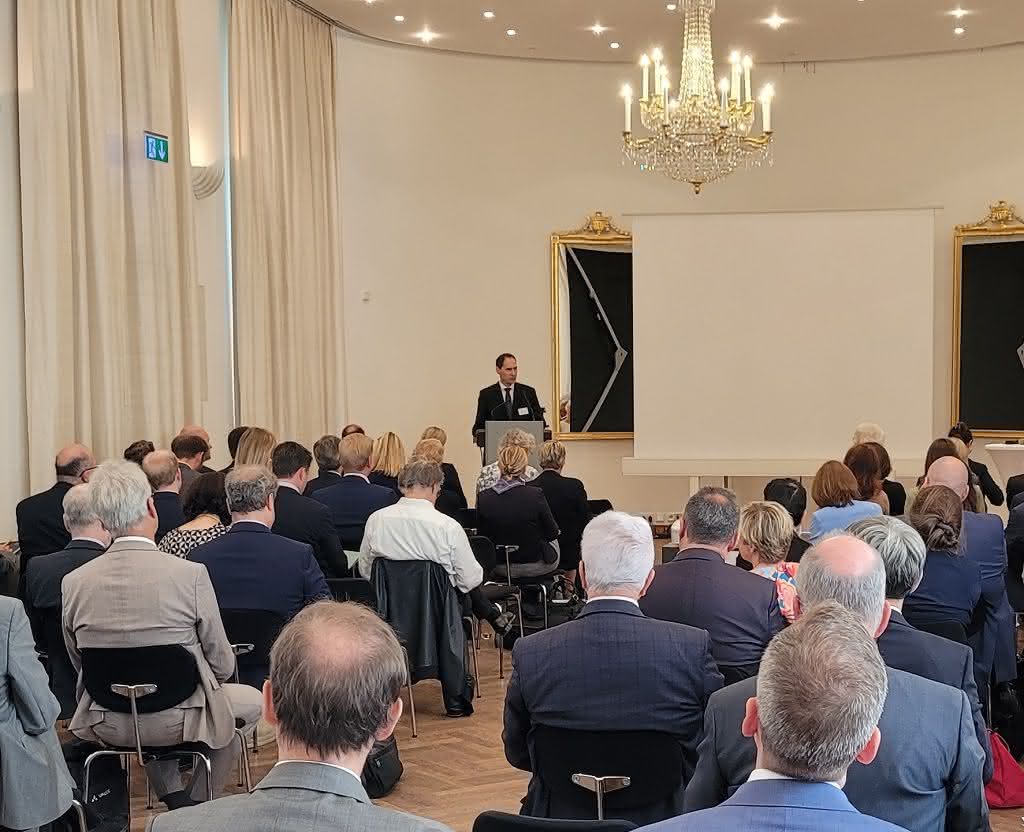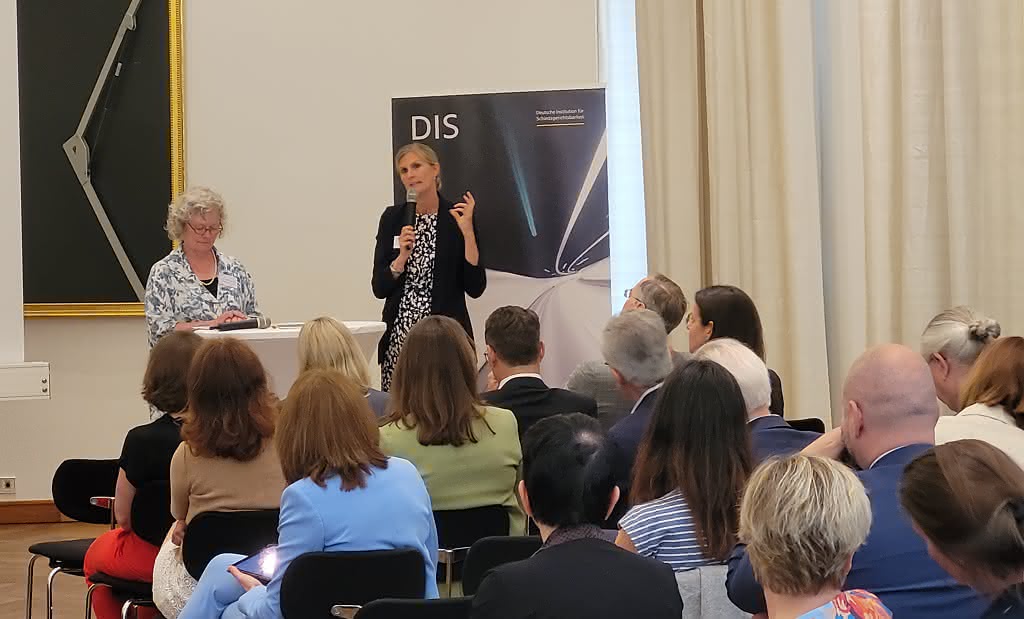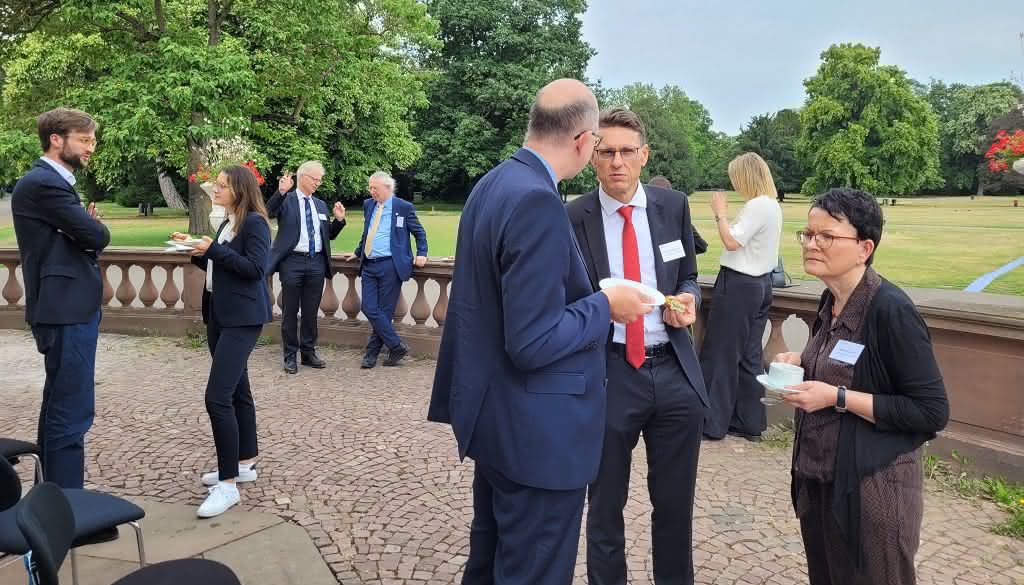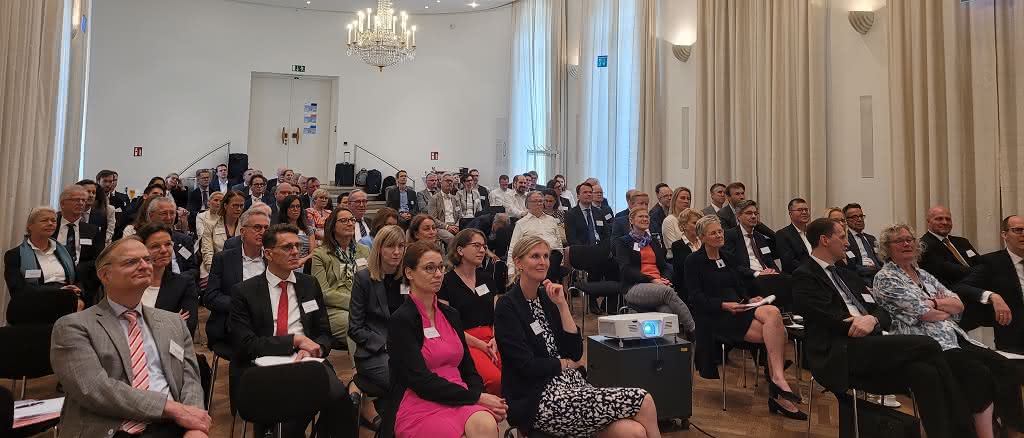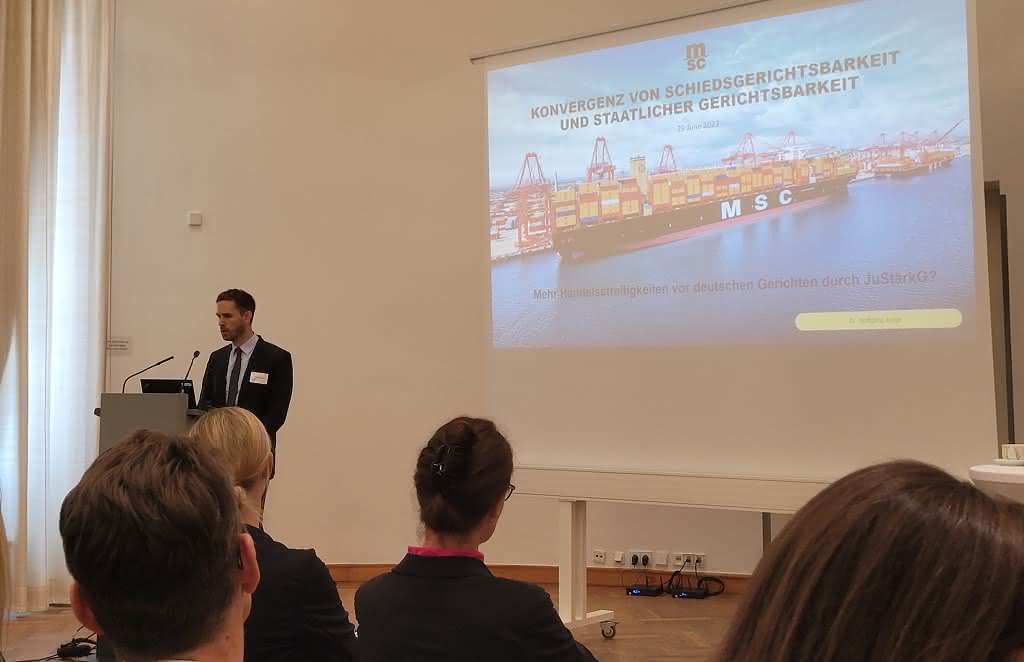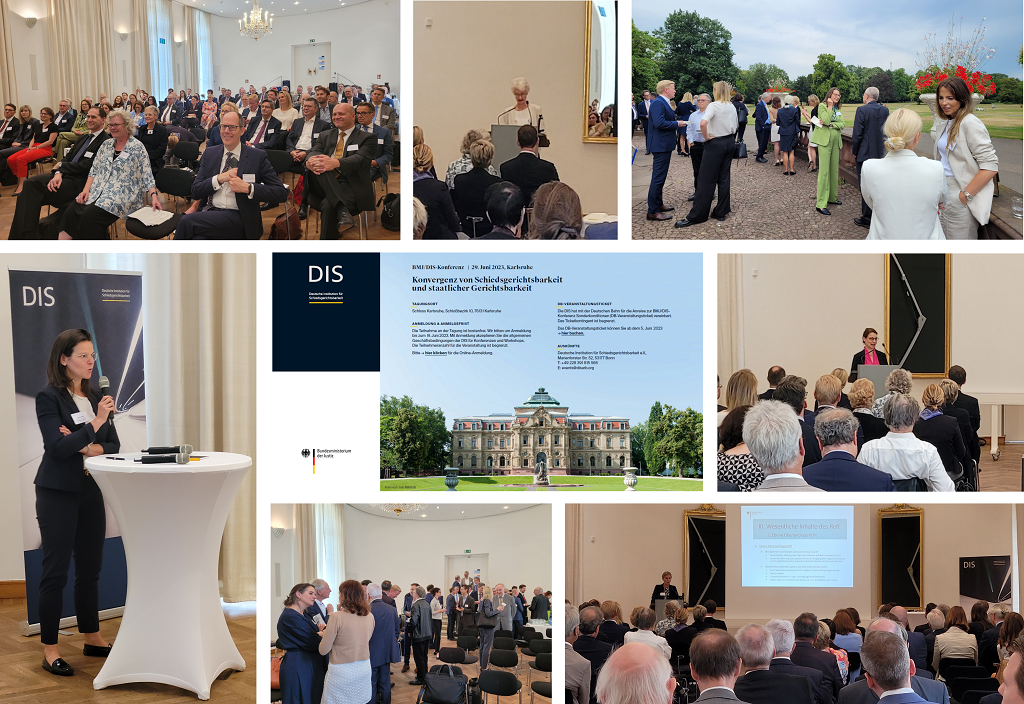
The Conference titled "Convergence of Arbitration and Litigation" was held on 29 June 2023 and took place at the Karlsruhe castle. The fourth Karlsruhe Conference was organized by the German Federal Ministry of Justice (BMJ) and the German Arbitration Institute (DIS) and gathered more than 100 participants from different legal professions.
Fortunately, the judiciary was particularly well presented among the participants and contributed lively to the following discussions. Overall, it can be noted that the room provided by the Conference was efficiently used and various thoughts and unclarities and/or criticisms were shared in the discussions and thereby made a valuable contribution to the future legal framework.

Introducing the Theme of the Conference: Convergence of Arbitration and Litigation
The Conference commenced with a welcome note of Vice President of the German Constitutional Court (BVerfG) Doris König. Ms König emphasized the Conference’s aim to promote the dialogue between the judiciary and arbitration community and pointed out that while the state is responsible to guarantee legal protection to its citizens, parties, on the contrary, likewise have a constitutional right to waive access to court and choose arbitration as dispute resolution. Both, litigation and arbitration, differ in various ways. Currently, the two mechanisms seem to converge, at least partially. According to Ms König, the approach must be to achieve compatibility between the two dispute resolution mechanisms and to ensure effective law enforcement, but also to create (and maintain) trust in the individually chosen legal mechanism.
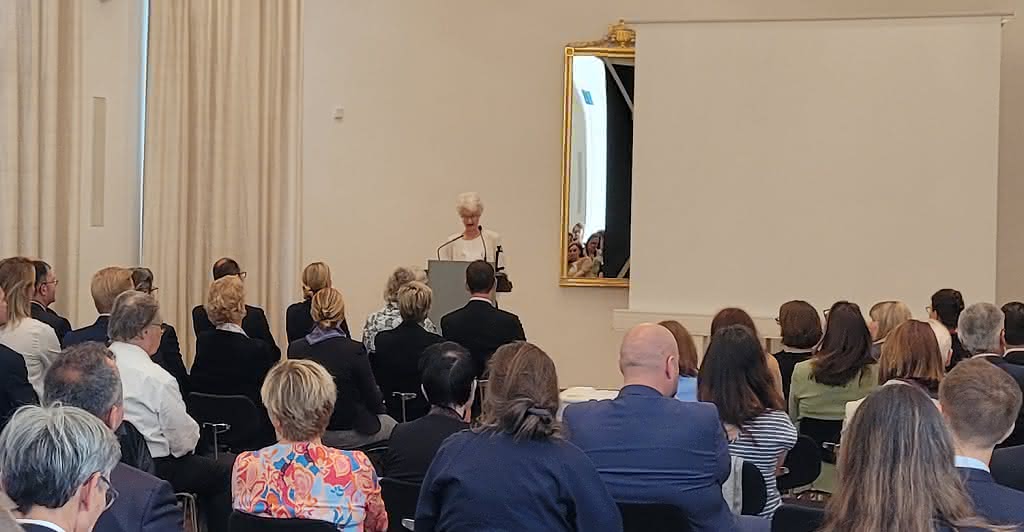
Subsequently, State Secretary at the BMJ Angelika Schlunck introduced the topic of the Conference by representing the term "convergence" in its meaning of "rapprochement" and "conformity". The question whether there is not rather an effective competition between the two mechanisms was raised. Ms Schlunck summarized the aim of the Conference to strengthen Germany's attractiveness and efficiency as an international legal center by fostering the communication and cooperation between the two systems. As cross-border business relationships, dominated by the English language, will further increase, Ms Schlunck noted that Germany may be supported as a choice of dispute resolution location through the introduction of English as a language of court proceedings. Ms Schlunck recommended seeing the competition of the legal mechanisms as an opportunity rather than a threat.
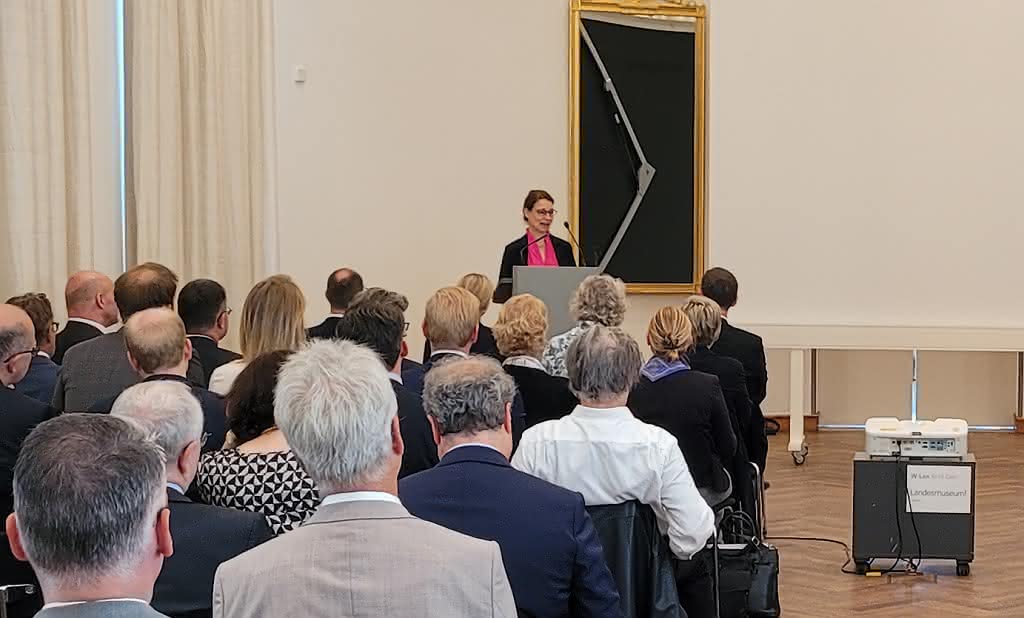
Following this, Reinmar Wolff, DIS Board Member, outlined the priority to strengthen Germany as a center for dispute resolution for which the drafts bills are welcomed and expressly encouraged. However, Mr Wolff realistically emphasized that no miracles should be expected solely from the draft bills. A mutual understanding of the mechanisms for each other, an international opening and better international marketing overall are indispensable to make Germany a strong location for dispute resolution.
Convergence – but How? The Introduction of Commercial Courts and Court Language English
The first panel was moderated by Andrea Schulz (BMJ) and addressed the convergence of litigation and arbitration under the draft bill for the Justizstandort-Stärkungsgesetz. The DIS had already commented on the draft bill earlier this year, in which it essentially welcomes the intention to strengthen Germany as dispute location and to provide the parties with efficient court proceedings geared to the needs of the business, but also stated that the draft needs to get fine-tuned. The panelist included Larissa Thole (BMJ), Thomas Riehm (University of Passau), Gerald Höbler (Fritz Winter Eisengießerei) and Wolfgang Junge (MSC Mediterranean Shipping Company). All panelists provided valuable views on the upcoming draft bill from their respective industries.
The first panel commenced with a presentation of the main content of the draft bill by Larissa Thole. The insufficient development of commercial law, especially in corporate transactions (where most companies prefer arbitration as an international and confidential dispute resolution forum), requires the introduction of commercial courts. The draft bill acknowledges the establishment of commercial chambers at the level of regional courts to allow for English-language proceedings while commercial courts are to be created at the level of the higher regional courts, regularly serving as courts of appeal. Mainly chosen by agreement between companies, commercial courts will be courts of first instance to hear disputes in the languages of German or English from a value in dispute of EUR 1 million and will offer multiple advantages such as a verbatim record and case management conferences as known from arbitration proceedings.
Thomas Riehm followed up and described the state judiciary as provider of dispute resolution services. The competition between both mechanisms is rather about regaining cases for litigation. About the accusation that a two-class-justice-system will be established, Mr Riehm countered such and stated that the introduction of commercial courts would not aggravate the existing situation, given that general jurisdiction already lacks resources. As a result, Mr Riehm concluded that commercial courts are not just a gimmick and that the aim, also under the financial aspect, must be to strengthen litigation.
The following discussion focused on whether the threshold of EUR 1 million is still too high (the previous threshold was set to EUR 2 million). More deeply, the discussion also concerned the lack of provisions on the issue of taking of evidence in the draft bill. Compared to the flexibility of the taking of evidence in arbitration proceedings, the civil procedure was criticized for (still) not providing modern solutions, but which also could have been introduced in the Justizstandort-Stärkungsgesetz. Therefore, it was concluded that the taking of evidence regulations for arbitration have a head start in comparison to litigation and probably will have as reform provisions are missing in the draft bill.
A different view, namely from a corporate perspective, was provided by Gerald Höbler and Wolfgang Junge. Both dealt with the question whether more commercial disputes will be brought to German courts if the draft bill becomes law. While Mr Höbler pointed out the benefits of arbitration and highlighted the necessity of the New York Convention of 1958, having judgments recognized and enforced internationally, Mr Junge additionally underlined the effective protection of business secrets and the confidentiality that makes arbitration proceedings still (more) attractive for companies. Mr Junge added that companies still prefer jurisdictions that they perceive as liberal. Therefore, the choice of law also influences choice of forum. In conclusion, both speakers were reticent with statements about an increase in commercial disputes.
Convergence to Litigation: The Pechstein and Steinbruch Decisions
Moderated by Johanna Wirth (DIS), the second panel included Gerhard Wagner (Humboldt University Berlin) and Wolfgang Kirchhoff (BGH) and discussed the impact of the Pechstein decision of the BVerfG and the Steinbruch decision of the German Federal Supreme Court (BGH) on arbitration.
The Pechstein case was presented and analyzed chronologically by Gerhard Wagner. In the Pechstein decision of the BVerfG, it declared an arbitration agreement in sports arbitration invalid under Art. 6 (1) ECHR, which did not provide for a right to a public hearing as one party had no choice but to submit to arbitration. Since arbitration agreements rarely provide for public hearings, a determination that no real freedom of choice exists effectively invalidates the arbitration agreement. Regarding the question of whether the Pechstein doctrine is applicable to commercial arbitration, Mr Wagner explained that the judgment is limited to cases in the field of sports arbitration. In his view, there is no basis for extending the principles of the Pechstein case by granting public arbitration. A key advantage of arbitration is that its confidentiality can always be guaranteed. Commercial arbitration would also lose its lofty status to corporations if the Pechstein disclosure principle were applied.
Subsequently, Wolfgang Kirchhoff delivered the Steinbruch decision, in which the BGH ruled that the correct application of fundamental norms (antitrust prohibitions) should be fully verified by the arbitral tribunal. Mr Kirchhoff stated that the Steinbruch decision was in line with previous case law and emphasized the comprehensive review (legal and factual) of arbitral awards by the ordinary courts with respect to antitrust provisions as they are part of the public policy (section 1059 (2) No. 2 lit. b ZPO).
What are the Consequences for Germany as a Dispute Resolution Location?
Following the previous discussions, the third panel, moderated by Nadine Lederer (BMJ), specified the consequences for Germany as a dispute resolution location. The panel included Martin Freitag (Hauptverband der Deutschen Bauindustrie), Andreas Singer (Higher Regional Court of Stuttgart) and Julia Klesse (GLNS).
Martin Freitag shared the construction industry’s perspective. Andreas Singer represented and presented the judiciary point of view by welcoming the draft bill and highlighted that for international competition, the judiciary must improve its services for parties. He likewise underlined his approach comes in "friendly mission" with arbitration.
The panel was completed with Julia Klesse emphasizing that litigation and arbitration mutually strengthen each other. According to Ms Klesse, the key for increasing popularity and good reputation of Germany as judicial location is also to create a strong place of arbitration. While strengthening Germany as a place of arbitration, it leads to more domestic arbitration proceedings, which in turn increases the number of ancillary and review proceedings before state courts. As a result, the attempts to strengthen the judicial and the arbitral location must interact.
Ruth Schröder (BMJ) closed the fourth Karlsruhe Conference and highlighted the constructive and inspiring discussions which ensured new and important impulses to the law reforms. In conclusion, Ms Schröder concluded that Germany already has good conditions as a location for the judiciary, which can be further enhanced by the draft laws. Nevertheless, the time ahead will be challenging for Germany's legal system. At the end, Stefan Kröll (DIS) reached a positive conclusion: the Conference achieved its goal of promoting the necessary dialogue between the judiciary and arbitration. With this statement, Mr Kröll sent the participants off.
Conclusion
Due to the lively discussions, the BMJ was provided with newfound food for thought which to consider when revising the drafts. It was once more shown that promotion of Germany as a location for dispute resolution can only be (and hopefully will be) reached through the essential dialogue of all actors in question.
Jonice V. Tischer (University of Marburg)

